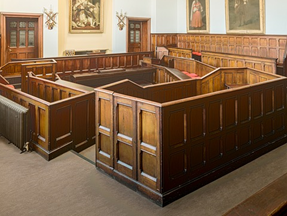
The United States Constitution and the Michigan Constitution both preserve the right to be tried by a jury when faced with a misdemeanor or felony. In a Michigan circuit court, you have a right to a fair and impartial jury of 12 of your peers and a unanimous verdict is required. In a Michigan district court, you are only entitled to a jury of 6 of your peers when facing a misdemeanor offense but a unanimous verdict must still be reached. Juries are not available for civil infractions such as speeding tickets since they are not considered criminal offenses. The defendant also has the option to waive a jury trial and instead hold a bench trial (meaning the judge listens to all the evidence and renders a verdict). The waiver must be in writing and done so with the agreement of the prosecutor (who may wish to proceed with a jury anyway). A jury trial is ALWAYS the default option unless the defendant chooses to waive.
Whether to proceed with a jury trial or a bench trial is a major consideration that has no right answer. This decision can turn on the nature of your criminal case and the ultimate strategy you wish to pursue. Here are some factors that play a role in the final decision to hold or waive the jury trial:
- “It Only Takes One To Hang” – All twelve jurors (or six in a district court misdemeanor case) must agree on a verdict of guilty or not guilty. A simply majority is not enough, for every last member of the jury must agree on the outcome. At a bench trial, there is only one judge and his or her ultimate decision about the case will be the sole verdict. In the event that the jury is deadlocked cannot reach a decision after a reasonable amount of time (even if due to one holdout juror), then the court may declare a mistrial. A jury trial may increase the chances of avoiding a conviction if a unanimous decision cannot be reached, an event that is not possible at a bench trial.
- Emotion v. Logic – There is conventional wisdom that a case that turns on the strict application of the law should be tried by a judge and a case that try to play to the sympathies of ordinary people should be tried by a jury. For example, someone accused of rape may be relying on a specific application of a particular law for an acquittal, a strategy that might be more effective with a judge instead of regular citizens disgusted by the ugly facts. On the other hand, a defendant accused of shooting a trespasser on his land and subsequently charged with second-degree murder might try to appeal to the jury’s respect for property ownership and home security in securing an acquittal when there is not a legal self-defense argument. This consideration depends on the individual facts and circumstance of the case. Ultimately, juries are unpredictable and it is impossible to know exactly how an individual juror will react to a particular piece of evidence.
- Speed and Expense – Generally, bench trials can be scheduled sooner and take less time to finish than a jury trial. A bench trial does not require certain procedural steps such as voir dire, opening statements and the reading of jury instructions. A faster trial probably means that the defendant is spending less money on attorney’s fees for his or her criminal defense. A quicker resolution to the case may help reduce the defendant’s anxiety and stress of waiting for an outcome.
- More Opportunities to Appeal – Since a jury trial has more procedural steps than a bench trial, there are more opportunities for mistakes to occur. These mistakes may result in more issues that can be raised to the appeals court in the event of a conviction. More issues increases the chances that the appellate judges will find a reversible error that causes the conviction to be vacated and a new trial to be ordered. The more complicated the proceeding, the more things that can go wrong and the more likely that the defendant can get out of a bad result.
- Intend to Represent Oneself – If a defendant opts for self-representation, then he or she might be better off telling their story to the judge in a bench trial. Without the assistance of an attorney, a defendant will likely make mistakes in evidence and procedure that are painfully noticeable to the jury. On the other hand, a judge is more likely to overlook these errors and focus on the facts presented to render a fair and impartial verdict. Jury trials do have an element of theatre to them and the jury might be inclined to render an unfavorable verdict based on unpolished presentation rather than the facts and the law. Conducting a jury trial is a daunting task made even more difficult if the defendant lacks the requisite knowledge and experience.
These factors may assist your decision for judge or jury but cannot determine the final result. Predicting the outcome of the jury trial or bench trial can be as random as the throwing of dice. However, the guidance of an attorney who has conducted both jury trials and bench trials is invaluable in making the best decision for your case.
If you need assistance with your important legal matter, do not hesitate to contact the experienced and skilled trial lawyers at Kershaw, Vititoe & Jedinak PLC.





